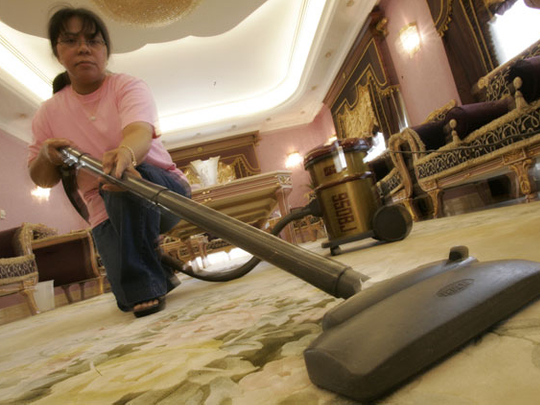
Kuwait City: The black market for domestic workers has increased due to the continued closure of recruitment agencies, Al Qabsa reported.
Due to the closure of recruitment agencies, brokers have been providing domestic workers’ services illegally and at a high price, thus taking advantage of the lack of competition.
These brokers have been advertising the services of domestic workers for 25 Kuwaiti dinars per hour and 250 Kuwaiti dinars per month.
The illegal domestic workers network divides the sum between the broker and the domestic worker. The domestic worker gets 10 Kuwaiti dinars for four hours of work and 15 Kuwait dinars goes to the broker, a source told Al Qabas.
The source went on to say that the Residency Affairs Department, in coordination with the Public Authority for Manpower, has sized numerous illegal domestic workers’ networks and found that 90 per cent of the domestic workers have expired residency permits.
There has been no indication as to who is running these illegal domestic workers’ networks.
The investigation revealed that those with expired residency permits had absentee notices against them by their employers before the COVID-19 crisis or were working for cleaning companies and their visas expired.
According to the source, they are pending deportation and their sponsors have been contacted, whether companies or individuals, to investigate whether they were involved in the operation.
A source from the Public Authority for Manpower pointed out that the domestic workers entered Kuwait through recruitment agencies and then they left their job, thinking that they will be able to make more money working for various employers rather than just one.
Advertisement of domestic workers’ services
Before the COVID-19 crisis, inspection teams were visiting salons, restaurants and cafes to uncover if those working at those establishments were holding a domestic workers permit. Due to the closer of these establishments due to the pandemic, many began working in homes and private businesses to earn a living.
In coordination with the Ministry of Interior, a total of 40 violators have been apprehended after complaints were filed because of the advertisements put out offering the services of domestic workers, the source from the Public Authority for Manpower added.
The Assistant Undersecretary of the Public Authority for Manpower, Dr. Mubarak Al Azmi, in coordination with the Ministry of Interior, prohibited the advertisement of domestic workers’ services.
He added that the social media networkers and advertising platforms are now free of employment advertisements, although some people publish ads from other countries to appear as if it is in Kuwait.
Last year, the BBC published an investigative report revealing how social media platforms and applications are being used to advertise domestic workers’ services.
Return of domestic workers
Due to the travel ban on 31 countries, many domestic workers find themselves stuck abroad unable to return to Kuwait, as the majority are from India, Philippines, Ethiopia and Bangladesh, all of which are countries listed on the travel ban, except Ethiopia.
In a statement to Al Qabas, head of the Federation of Domestic Workers Office, Khaled Al Dakhan, said that it is necessary to allow domestic workers to return to Kuwait. He suggested that they quarantine upon their arrival and carry a PCR certificate proving that they are free of any illness or virus.
Domestic workers in Kuwait
According to the International Labour Organization (ILO), there are 660,00 domestic workers in Kuwait.
In Kuwait, domestic workers are unable to work in the private sector as they enter Kuwait with visa No 20, which differs from visa No 18 which is for private sector workers.
Domestic workers, throughout the world, work for private households, in most cases without clear terms of employment and are excluded from the scope of labour legislation, as per ILO’s definition.
Many use the term ‘modern day slavery’ to explain the working conditions of domestic workers, as they often work long hours, are paid low wages and have little to no time off.
In 2015, the National Assembly passed a law granting domestic workers the right to 30 days paid leave per year, one day off per week and a maximum 12-hour working day with rest. Then in 2016, a decree by Interior Minister, Sheikh Mohammad Khaled Al Sabah, led to the creation of a minimum wage of 60 Kuwaiti dinars for domestic workers.








